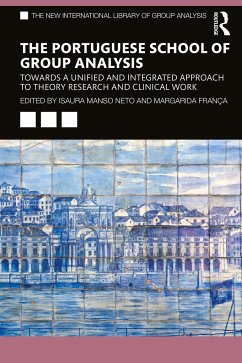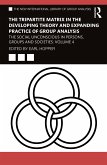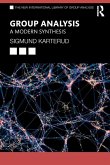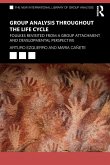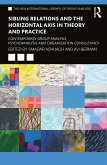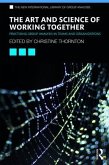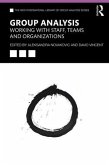At the time group analysis was emerging in the United Kingdom through the ideas of S. H. Foulkes, one of his followers, Eduardo Luís Cortesão, returned to Portugal and founded the Portuguese Society of Groupanalysis, with the first group-analytic Symposium taking place in Estoril, Portugal, in 1970. In this vital new book, an impressive collection of contributors demonstrate how group analysis in Portugal has always embraced the relational paradigm that has become central to contemporary psychoanalysis.
The Portuguese school of groupanalysis, through several of its senior members, has contributed to many of the organizations responsible for the development of group analysis, such as EGATIN, IAGP and GASi. Nevertheless some of the concepts and variations of the Portuguese school of groupanalysis tend to be unknown to the English speaker. Their focus is on the "pattern", allowing transformation of each patient's personal matrix, working through primitive relational failures and paving the way to new beginnings, always in a transgenerational group context.
This book will be of tremendous importance to psychotherapists working in group analysis around the world.
The Portuguese school of groupanalysis, through several of its senior members, has contributed to many of the organizations responsible for the development of group analysis, such as EGATIN, IAGP and GASi. Nevertheless some of the concepts and variations of the Portuguese school of groupanalysis tend to be unknown to the English speaker. Their focus is on the "pattern", allowing transformation of each patient's personal matrix, working through primitive relational failures and paving the way to new beginnings, always in a transgenerational group context.
This book will be of tremendous importance to psychotherapists working in group analysis around the world.
"The book examines the trajectory of the group-analysis from its original context to its contemporary evolution, making a special contribution to identify the psychoanalytic concepts that are relevant and necessary for the group-analytical practice. A highly recommended book for all those interested in the theoretical, technical and applied aspects of current group psychotherapy."
Alejandro Avila Espada, PhD, Complutense University, Madrid, Spain
"The book enabled me to understand the basic principles of the Portuguese Group Analysis Institute and of their effort to keep Group Analysis close to the paradigm of psychoanalysis. All in all, the book has solid theoretical and clinical bases, presented in clear writing."
Angela Sordano, psychologist and psychotherapist, past president of a Psychodrama Italian Association (Apragipsicodramma)
"For all those, with an interest in our field, this book provides a welcome and much-needed account, in English, of the 'Portuguese model'. In articulating this distinctive approach, against the broader historical background of Group Analysis, the authors remind us of its vital international character."
David Glyn, president, Group Analytic Society International
"In a remarkable way, the book "The Portuguese School of Group Analysis" introduces the reader in the several contexts that were critical for the birth of the group approaches to the field of psychotherapies. In that sequence, the pioneer work of the founding father of groupanalysis in Portugal, Eduardo Cortesão, is highlighted specially in what respects to its original contributions. The authors produced a very interesting reflection about transference neurosis in the context of groupanalysis. Also the exploration of concepts like grupanalytic matrix and personal group matrix is done in a deep and useful way The authors offer us a reflection about topics like training, supervision, and unexpectedly the group analyst as a patient.
After reading this important piece of literature on everything that respects to psychological clinical relationships and clinical reflections, there is just one thing that I would like to say to the authors: Thank you very much for being so useful for all of us."
João Justo, Professor of Clinical Psychology at the Faculdade de Psicologia da Universidade de Lisboa
"This most interesting book puts forward an in-depth discussion of the very nature of our discipline, what is and what is not group analysis, its concepts, research, techniques, practice, and training, and its relation with psychoanalysis. I therefore strongly recommend the reading of this veritable textbook, which has much to teach us and shall surely favour the development of controversial discussions within the analytic community on some very basic issues."
Juan Tubert-Oaklander, MD, PhD, psychoanalyst, group analyst, and marriage and family psychotherapist, professor in the Master´s Degree course of psychoanalytic psychotherapy and founder of the doctoral program on psychoanalysis and group analysis at the Marista University of Mérida, Mexico.
"In addition to a wealth of references and numerous practical examples, the book is an inspiring treasure trove for every clinician and practitioner. It invites discussion of contemporary controversial group analytic positions and is thus an important voice in the matrix of group analytic discourse."
Jutta Gliem, chair of EGATIN
"This book is not only the long-missed history of the Portuguese school of group analysis. It's also a comprehensive and thorough description of its present conceptional understanding of theory, methods and clinical use of group analysis and the requirements in training, which are probably the most demanding in Europe. An engaging and inspiring reading."
Kristian Valbak, PhD, group analyst and former president of EGATIN
"What a pleasure to be introduced to the Portuguese school of Group Analysis and its prominent figures. The authors present key concepts and lively clinical anecdotes that focus us on the unique presence of each individual, not only on group dynamics, thereby diverging from Foulkes and Bion and connecting group theory and practice to contemporary relational principles."
Richard Billow, PhD, clinical professor and director of the institute's postdoctoral program in group psychotherapy, Adelphi University, New York
"This is a most interesting book about the different identity of Portuguese school of "groupanalysis". Cortesao, its founder, conceptualized a fascinating framework of three times a week group analysis, which is considered "a psychoanalytic treatment of the individual in and through the group". This book will be an important step into a fertile international dialogue between different approaches of group analytic therapy."
Robi Friedman, group-analyst, former president of the International Group Analytic Society, former chair of the Israeli Institute for Group Analysis
"The book seeks to integrate theory, clinical wisdom and research and generously offers clinical examples and references to illustrate and support the text I am happy to recommend this comprehensive, ambitious and well-written book, which addresses and reflects upon questions that are highly important and urgently need answers."
Steinar Lorentzen, Professor of Psychiatry at the University of Oslo, psychoanalyst, group analyst
"This book approaches the historical aspects of Group Analysis and its evolution towards its high current development. The book is a fundamental contribution for who has interest in psychoanalysis and therapeutic groups."
Waldemar Fernandes, MD, past president of the Federação Latino-Americana de Psicoterapia Analítica de Grupo (FLAPAG)
Alejandro Avila Espada, PhD, Complutense University, Madrid, Spain
"The book enabled me to understand the basic principles of the Portuguese Group Analysis Institute and of their effort to keep Group Analysis close to the paradigm of psychoanalysis. All in all, the book has solid theoretical and clinical bases, presented in clear writing."
Angela Sordano, psychologist and psychotherapist, past president of a Psychodrama Italian Association (Apragipsicodramma)
"For all those, with an interest in our field, this book provides a welcome and much-needed account, in English, of the 'Portuguese model'. In articulating this distinctive approach, against the broader historical background of Group Analysis, the authors remind us of its vital international character."
David Glyn, president, Group Analytic Society International
"In a remarkable way, the book "The Portuguese School of Group Analysis" introduces the reader in the several contexts that were critical for the birth of the group approaches to the field of psychotherapies. In that sequence, the pioneer work of the founding father of groupanalysis in Portugal, Eduardo Cortesão, is highlighted specially in what respects to its original contributions. The authors produced a very interesting reflection about transference neurosis in the context of groupanalysis. Also the exploration of concepts like grupanalytic matrix and personal group matrix is done in a deep and useful way The authors offer us a reflection about topics like training, supervision, and unexpectedly the group analyst as a patient.
After reading this important piece of literature on everything that respects to psychological clinical relationships and clinical reflections, there is just one thing that I would like to say to the authors: Thank you very much for being so useful for all of us."
João Justo, Professor of Clinical Psychology at the Faculdade de Psicologia da Universidade de Lisboa
"This most interesting book puts forward an in-depth discussion of the very nature of our discipline, what is and what is not group analysis, its concepts, research, techniques, practice, and training, and its relation with psychoanalysis. I therefore strongly recommend the reading of this veritable textbook, which has much to teach us and shall surely favour the development of controversial discussions within the analytic community on some very basic issues."
Juan Tubert-Oaklander, MD, PhD, psychoanalyst, group analyst, and marriage and family psychotherapist, professor in the Master´s Degree course of psychoanalytic psychotherapy and founder of the doctoral program on psychoanalysis and group analysis at the Marista University of Mérida, Mexico.
"In addition to a wealth of references and numerous practical examples, the book is an inspiring treasure trove for every clinician and practitioner. It invites discussion of contemporary controversial group analytic positions and is thus an important voice in the matrix of group analytic discourse."
Jutta Gliem, chair of EGATIN
"This book is not only the long-missed history of the Portuguese school of group analysis. It's also a comprehensive and thorough description of its present conceptional understanding of theory, methods and clinical use of group analysis and the requirements in training, which are probably the most demanding in Europe. An engaging and inspiring reading."
Kristian Valbak, PhD, group analyst and former president of EGATIN
"What a pleasure to be introduced to the Portuguese school of Group Analysis and its prominent figures. The authors present key concepts and lively clinical anecdotes that focus us on the unique presence of each individual, not only on group dynamics, thereby diverging from Foulkes and Bion and connecting group theory and practice to contemporary relational principles."
Richard Billow, PhD, clinical professor and director of the institute's postdoctoral program in group psychotherapy, Adelphi University, New York
"This is a most interesting book about the different identity of Portuguese school of "groupanalysis". Cortesao, its founder, conceptualized a fascinating framework of three times a week group analysis, which is considered "a psychoanalytic treatment of the individual in and through the group". This book will be an important step into a fertile international dialogue between different approaches of group analytic therapy."
Robi Friedman, group-analyst, former president of the International Group Analytic Society, former chair of the Israeli Institute for Group Analysis
"The book seeks to integrate theory, clinical wisdom and research and generously offers clinical examples and references to illustrate and support the text I am happy to recommend this comprehensive, ambitious and well-written book, which addresses and reflects upon questions that are highly important and urgently need answers."
Steinar Lorentzen, Professor of Psychiatry at the University of Oslo, psychoanalyst, group analyst
"This book approaches the historical aspects of Group Analysis and its evolution towards its high current development. The book is a fundamental contribution for who has interest in psychoanalysis and therapeutic groups."
Waldemar Fernandes, MD, past president of the Federação Latino-Americana de Psicoterapia Analítica de Grupo (FLAPAG)

